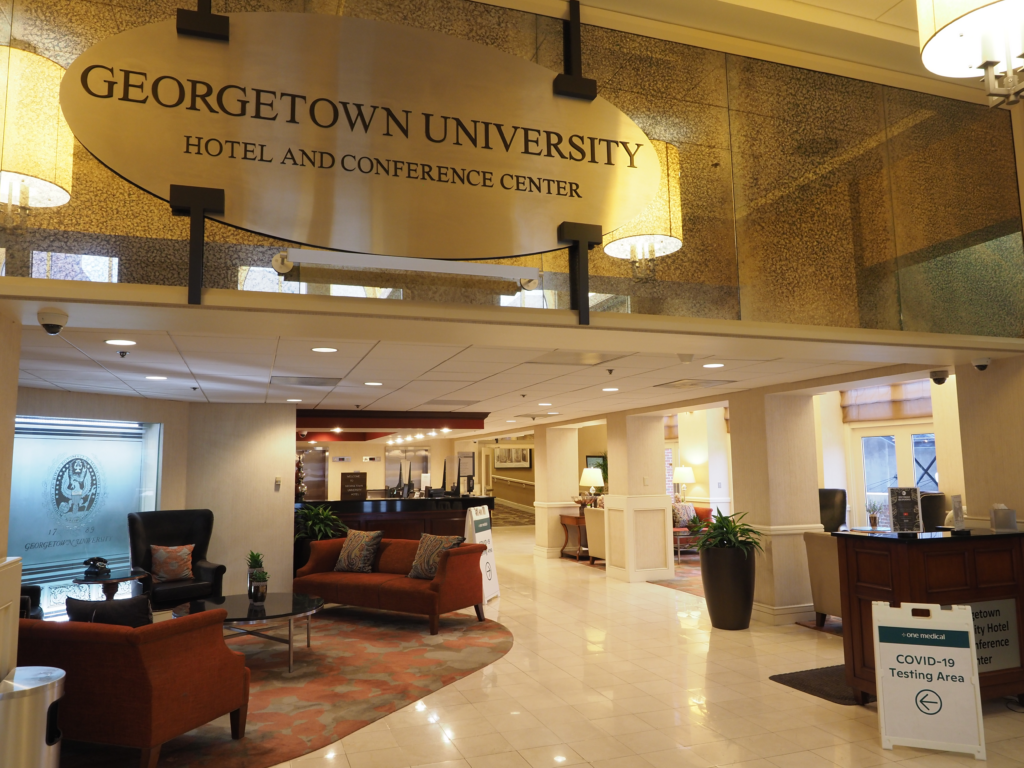As first-years and sophomores adjust to residential and academic life on campus, some are now facing a new challenge: navigating full-time residence in a hotel room.
Due to an unprecedented number of underclassmen in need of on-campus housing, some Georgetown University students received housing assignments in the Georgetown University Hotel and Conference Center, according to an email from the Office of Residential Living to students obtained by The Hoya. The university assigned students who filled out the 2021-2022 housing application late to the hotel, according to the email.
Residential Living notified approximately 80 students via email that they would be living in the hotel Aug. 4, less than three weeks before move-in for on-campus students. Meanwhile, all other students residing on campus both applied for housing and received confirmation of their residence in June.
The Aug. 4 email did not clarify why there are more students enrolled than the university can house in traditional residences.

According to Evan Peters (MSB ’24), who lives in the hotel, the university did not adequately communicate to students the logistics of moving into the hotel.
“Just knowing if I would be in the hotel was chaotic,” Peters said in an interview with The Hoya. “They didn’t know until August 4 when they emailed me. They did not give me any information, even once I knew I was in the hotel, I did not know what furniture would be in the hotel, if we had to bring our own sheets and towels, and the square footage of the hotel.”
The hotel provides students with linens, pillows and housekeeping services three times a week, according to the Fall 2021 Residential Living Hotel Resource Guide. Students in the hotel do not have on-site laundry and must go to Arrupe Hall or Henle Village to access washers and dryers, according to the email, though the university has added more money in their laundry and print accounts than other on-campus students.
Even with these resources, Peters said students in the hotel feel unfairly neglected.
“It feels like the hotel students were kind of forgotten about,” Peters said. “I feel like that and a lot of the other hotel people feel the same way. I understand we made a mistake and we’re a small group on campus, but it still feels like no one cares.”
When asked for comment, a university spokesperson redirected The Hoya to the Aug. 4 email from Residential Living.
For Akil Cole (COL ’24), however, the hotel experience has not been entirely negative.
“I think every aspect of my college experience has been nontraditional, so I was like, why not another thing?” Cole said in an interview with The Hoya. “It would have been nice to have a communal kitchen, but I am glad with the selection, and in hindsight I would have done the same thing.”
This is not the first time students have lived in the hotel, whether permanently or for extenuating circumstances. In 2019, the university relocated 85 students from Alumni Square, an apartment-style dorm, to the hotel after administrators identified structural roofing concerns. The last time the university assigned students to permanent residence in the hotel was 2015 while the university completed the construction of Arrupe Hall.
The hotel lacks the sense of natural community typically fostered in a traditional dormitory, according to Nia Vasquez (COL ’23), the only Residential Advisor living in the hotel.
“Two hotel floors hold way more students, so I feel like it is going to be way more difficult to create a tight-knit community,” Vasquez said in a phone interview with The Hoya.
Cole said the presence of an RA has been helpful in shaping a more standard residential experience.
“I think it’s still forming,” Cole said in an interview with The Hoya. “The RA has been really active in trying to get us together. She’s planning different events for all of us. It’s still getting there. We’re only two weeks into the residential experience, so it’s not as cohesive as one might hope, but I think it will take time for that.”
Despite the unconventional residential experience, Vasquez said she is hopeful students can find community among their hallmates.
“I tried to foster community by making a group chat for all the students in the hotel and organizing various social events.” Vasquez said. “I hope that despite the untraditional living conditions, students will be able to bond and make new relationships.”





















fethiye otel • Oct 22, 2021 at 10:27 am
nice post, thank you